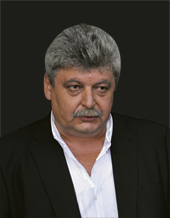«There are great prospects in the cultivation of fruit-bearing trees not only of the Temperate but also of the Tropical and Subtropical zone by the producers of the Association of Rethymnon since there are suitable soil and climatic conditions» referred in an interview to «In-On» magazine the chairman of the Association of Rethymnon Mr. Nikolaos Birlirakis.
Apart from cultivating olive oil trees -he mentioned- a plantation that is first in the production of the Association, today we grow citrus trees, avocado and locust trees in a small piece of land and in even smaller areas we grow banana trees, cherry trees, fig trees, apricot trees, apple trees, pear trees, peach trees, plum trees and walnut trees, while for fruit-bearing trees such as pomegranate trees, lotus and Indian figs there are not organized commercial plantations but only studded trees whose number, however, is significant.
It is also possible -he said- to grow fruit-bearing trees like mango trees, leach trees, date-palms, cherimoya, guava, Indian figs tree, pass flora, papaya or pecan which has successfully developed within an experimental framework during the last 20 years by the Institute of Olive Oil trees and Subtropical Plants of Chania.
The commercial cultivation of the previously mentioned fruit-bearing trees by the Association promises well for the following reasons:
• The prefecture of Rethymnon is ideal regarding climatic conditions (temperature, relative moisture, sunshine), the soil and irrigation system for successful cultivation.
• Their cultivation areas are very restricted not only in Greece but in other countries as well due to their special requirements regarding temperature, moisture, soil and water.
• The distribution of the fruit to the European Market is limited, while the demand is significant and therefore we do not have a trading problem since the market is full to the brim.
• The largest part of the fruit can be locally consumed by the millions of tourists that visit Crete every year.
It has to be noted -he continued- that in the prefecture of Rethymnon there are almost 3.000.000 olive oil trees and 4615 stock-farmers breeding almost 350.000 sheep and goats and in March 2007 the Dairy factory of ΕΑS Rethymnon was certified with the HACCP system.
Moreover, he clarified that «the capability of milk production that the potentiality of the prefecture represents and the concentration of the amount that Ε.Α.S. Rethymnon has, comes to up 4.440 tons of milk with a turnover in 2009 of almost 5.7 million Euros while for 2010 it is expected to reach 6 million Euros. This amount is guaranteed by the Association for its excellent quality and also its excellent processing. Furthermore, the production of olive oil has reached 1,5 tons in 2009 while for 2010 it is expected to reach 3 million Euros.
It has to be mentioned here that, there is a Center of Agricultural Development, which consists of a new shop of agricultural supplies, the agricultural multi-lab, the veterinary center, the apiary and the Health Promotion Unit (Rural Clinic) realizing a turnover of 5 million Euros for 2008 and 2009 while for 2010 it is expected to double.
The aims of the Center are:
• The improvement of the financial situation and the development of the agricultural and cattle-breeding exploitations of Rethymnon prefecture.
• The direct channeling of the latest agronomic and veterinary knowledge to the Rethymnian producer.
• The upgrading of the services provided by the Association to the agricultural world».
Historical facts.
The Association of Rethymnon was founded in 1937 based on the decision number 15295/31.03.1937 by the Minister of Agriculture.
The stock capital reaches the amount of 2.325.312 €, distributed in 180 shares.
The Association is run and is responsible for the largest part of the production and the exploitation of the agricultural products of the prefecture.
Today the Association of Rethymnon constitutes one of most dynamic economic cooperatives.
More specifically:
• It possesses landed property of 30 million €.
• The work circle for 2008 reaches 10.052.263, 27 €.
• There is a permanent stuff of 75 workers and 15 seasonal-employed workers.
• There are balance surpluses for the last six years.
Source of publication 8th issue In-On

